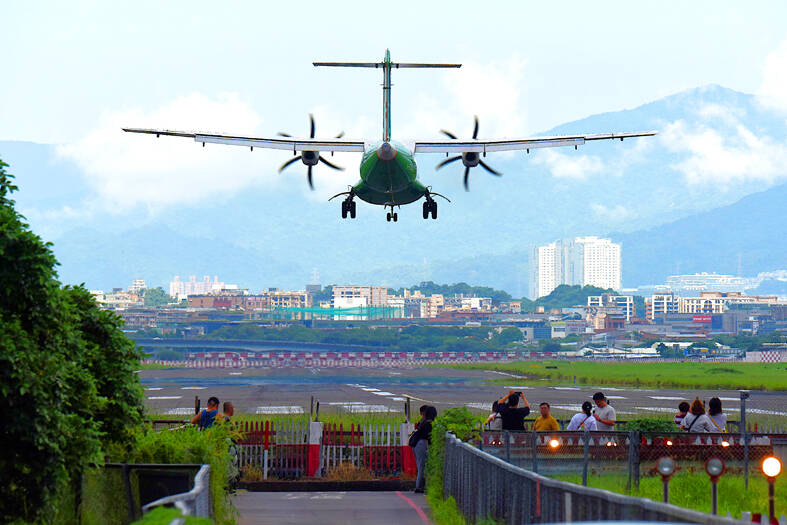Members of the public have complained that the Military Installation Safety Protection Act (軍事營區安全維護條例), which prohibits photographing or filming inside military control zones, was unclear and “unfairly enforced.”
Aviation enthusiasts have been told to stop filming civilian aircraft takeoffs and landings near Taipei International Airport (Songshan airport), but the airport frequently posts photos of planes and runways on Facebook, they said, adding that the government has “double standards” and is unfairly targeting the public.
In the past, Taiwan had more than 80 military zones, which covered 39,700 hectares. Today, only 22 zones remain, covering 5,539 hectares.

Photo: Wu Liang-yi, Taipei Times
The Ministry of National Defense, which proposed the act that was promulgated earlier this month, said that it aimed to maintain the integrity and security of the remaining military zones.
The act stipulates that photographing or filming areas inside military zones, or engaging in activity deemed harmful to security could result in fines between NT$30,000 and NT$150,000.
To date, nobody has been fined under the act, but aviation fans taking photos near Songshan airport have been asked by military personnel or police to leave, and in some cases have had to show proof that their photos did not include restricted military facilities.
People said it is unreasonable to treat ordinary people photographing planes from the roadside “as if they were spies.”
The airports in Taipei, Taichung, Chiayi, Tainan, Penghu and Hualien are all dual-use civilian-military airports, and are therefore affected by the act. Domestic passengers at these airports are now reminded through in-flight announcements not to photograph the airports during takeoff and landing.
The ministry said that the non-military sections of airports could still be photographed or filmed, and that the percentage of these sections differs by airport. For example, most of Songshan airport is not a restricted military zone — which means runways, aircraft movements and terminals at the airport could be photographed — while more than 90 percent of Hualien and Taichung airports are restricted areas.
However, people said that enforcement standards around Songshan airport were inconsistent and confusing.
For example, Lane 180 of Binjiang Street, known as “Airplane Alley,” has long been a popular location for planespotting, as it offers clear views of civilian aircraft. It does not include views of military facilities, but warning signs have been posted along the road which read: Airport control zone — no trespassing, photography, recording, mapping, fireworks or hunting.
Songshan airport director Cheng Chien-chung (鄭堅中) said that aviation police are primarily concerned with flight safety and preventing people from climbing over fences, not banning photography.
The warning signs were originally installed to comply with now-outdated laws, he said, adding that adjustments to the signage would be discussed with the military.
Minister of National Defense Wellington Koo (顧立雄) previously said that photographing military aircraft taking off does not contravene the law. However, deliberately photographing sensitive areas inside a military camp with the intent of conducting reconnaissance would be illegal.
Deputy Minister of Transportation and Communications Lin Kuo-hsien (林國顯) on Sunday said that aviation enthusiasts who want to photograph aircraft near dual-use airports should first consult the military zone maps published by the defense ministry.
As long as people avoid restricted areas and focus solely on civilian aircraft movements, there should be no legal issues, he said.

The Coast Guard Administration (CGA) yesterday said it had deployed patrol vessels to expel a China Coast Guard ship and a Chinese fishing boat near Pratas Island (Dongsha Island, 東沙群島) in the South China Sea. The China Coast Guard vessel was 28 nautical miles (52km) northeast of Pratas at 6:15am on Thursday, approaching the island’s restricted waters, which extend 24 nautical miles from its shoreline, the CGA’s Dongsha-Nansha Branch said in a statement. The Tainan, a 2,000-tonne cutter, was deployed by the CGA to shadow the Chinese ship, which left the area at 2:39pm on Friday, the statement said. At 6:31pm on Friday,

The Chinese People’s Liberation Army Navy’s (PLAN) third aircraft carrier, the Fujian, would pose a steep challenge to Taiwan’s ability to defend itself against a full-scale invasion, a defense expert said yesterday. Institute of National Defense and Security Research analyst Chieh Chung (揭仲) made the comment hours after the PLAN confirmed the carrier recently passed through the Taiwan Strait to conduct “scientific research tests and training missions” in the South China Sea. China has two carriers in operation — the Liaoning and the Shandong — with the Fujian undergoing sea trials. Although the PLAN needs time to train the Fujian’s air wing and

Taiwanese celebrities Hank Chen (陳漢典) and Lulu Huang (黃路梓茵) announced yesterday that they are planning to marry. Huang announced and posted photos of their engagement to her social media pages yesterday morning, joking that the pair were not just doing marketing for a new show, but “really getting married.” “We’ve decided to spend all of our future happy and hilarious moments together,” she wrote. The announcement, which was later confirmed by the talent agency they share, appeared to come as a surprise even to those around them, with veteran TV host Jacky Wu (吳宗憲) saying he was “totally taken aback” by the news. Huang,

The American Institute in Taiwan (AIT) put Taiwan in danger, Ma Ying-jeou Foundation director Hsiao Hsu-tsen (蕭旭岑) said yesterday, hours after the de facto US embassy said that Beijing had misinterpreted World War II-era documents to isolate Taiwan. The AIT’s comments harmed the Republic of China’s (ROC) national interests and contradicted a part of the “six assurances” stipulating that the US would not change its official position on Taiwan’s sovereignty, Hsiao said. The “six assurances,” which were given by then-US president Ronald Reagan to Taiwan in 1982, say that Washington would not set a date for ending arm sales to Taiwan, consult